|
|
|
Sort Order |
|
|
|
Items / Page
|
|
|
|
|
|
|
| Srl | Item |
| 1 |
ID:
145521
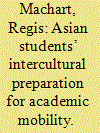

|
|
|
|
|
| Summary/Abstract |
Many academic contributions on Asian students abroad focus on their lack of interactions with the local population and their unpreparedness for intercultural encounters. Asian students appear as socially deficient and unfit for the new environment. These assumptions are problematic because they do not take into consideration the input prospective students receive prior to their departure through institutional training and unsupervised research on the host country under the student’s own initiative or a mix of both. Representations are also based on cultural differentialism which locates individuals in distinct, boundary-making categories, thus silencing most forms of individual diversities in the home and host societies. The main question arising thus deals with the kind of input that Asian future mobile students acquire, which is susceptible to impact their intercultural experiences. Data used for this article come from three different sets of interviews with Asian mobile students. Using a critical discourse approach, the discourses of these students are analysed from the perspective of their preparation to move to the host destination. Recurrent othering processes—both from institutional actors and from the students themselves—appear prior to departure, independent of the students’ origin and destination. Rather than blaming students, it would be more significant to look at what materials are available for them prior to their departure.
|
|
|
|
|
|
|
|
|
|
|
|
|
|
|
|
| 2 |
ID:
134162
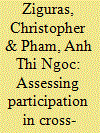

|
|
|
|
|
| Publication |
2014.
|
| Summary/Abstract |
One of the limitations of research on global educational mobility has been the primary classification of key participants - students and educational institutions - in national terms. This paper tests the challenges involved in such methodological nationalism by examining the provision of cross-border education in one city. As Vietnam's commercial centre, Ho Chi Minh City (HCMC) has experienced rapid transformation over the past two decades as the country has moved steadily from a state-directed to a more market-driven and globally integrated economy. Since the late 1990s there has been a parallel growth in cross-border higher education in HCMC, through the outbound mobility of students and the provision of foreign programmes by international partnerships and branch campuses. Drawing on available data supplemented with insights gleaned from interviews and existing literature, this paper develops a methodology for identifying and quantifying the key features of each form of domestic, overseas and transnational provision. We estimate that around 6% of HCMC's tertiary students are studying overseas and between 2% and 3% in foreign programmes delivered in the city. The rates of enrolment in overseas and transnational programmes by students in HCMC are thus far higher than for Vietnam as a whole, but still considerably lower than in those well-established cross-border education hubs, Hong Kong and Singapore. We argue that concerns about the growth of private education and inequalities in access may continue to limit the growth of transnational provision in HCMC.
|
|
|
|
|
|
|
|
|
|
|
|
|
|
|
|
| 3 |
ID:
143522
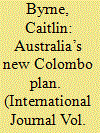

|
|
|
|
|
| Summary/Abstract |
The New Colombo Plan (NCP), a key plank in the Australian government’s foreign policy agenda, leverages student mobility as public diplomacy to improve Australia’s standing and influence within the Indo-Pacific region. Conceptualized as a “rite of passage” for young Australians, the NCP has been welcomed by Australian business, industry groups, and stakeholders because of its potential to deliver lasting relationships and practical economic benefits. Coordinated by the foreign affairs portfolio, the NCP represents a significant and distinct component of Australia’s public diplomacy, firmly aligned to advance the state’s economic diplomacy agenda. This paper explores the evolution of the NCP. It draws on stakeholder impressions from the program launch and pilot to explore early limitations and deeper soft power challenges. Findings suggest that the NCP is robust, yet key issues of strategic coherence, partnership, and evaluation require further attention if it is to deliver on its soft power promise.
|
|
|
|
|
|
|
|
|
|
|
|
|
|
|
|
| 4 |
ID:
091951
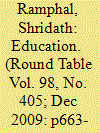

|
|
|
|
|
| Publication |
2009.
|
| Summary/Abstract |
The 2009 UK Forum for International Education and Training conference theme, politics, policies and progress in education, can be illustrated from experiences of government in Guyana, of the role of the Secretary General of the Commonwealth and of influential UN commissions. Tremendous progress has been made in the expansion and development of Commonwealth education systems over the past 50 years, although many obstacles have been encountered. Understanding of the potential and limitations of education in relation to development has greatly increased, but persistent problems of quality and inequality have yet to be resolved. As the world has shrunk, international interdependence in education has increased and the global community needs to apply policy formation and political processes intelligently in national as much as in international contexts. The Commonwealth has never enjoyed the 'hard power' at the disposal of larger bilateral and multilateral agencies through their substantial financial resources. It has the 'soft powers' of pioneering thinking and progressive strategy, consultation and co-operation across economic social and cultural divides, and of empowering even the smallest Commonwealth countries. The 'soft power' approaches to which the Commonwealth is committed should be an increasingly valued part of international policy-making and political accommodation in educational initiatives, through which a more equitable and harmonious future world community can be built.
|
|
|
|
|
|
|
|
|
|
|
|
|
|
|
|
| 5 |
ID:
145520


|
|
|
|
|
| Summary/Abstract |
This paper problematizes the imagineering of study abroad, especially in terms of set objectives and learning outcomes. The authors propose a shift away from a ‘pure’ cultural and intercultural preparation of mobile students, which tends to ignore the fact that unrealistic expectations and preconceived ideas about study abroad can be as much of a hindrance as e.g. ‘culture shock’. The concept of imaginaries is used to prepare international students, some from Asian countries, to reflect on, discuss and ‘reform’ their perceptions of study abroad. Imaginaries, which are constitutive of human beings living in groups, are of course necessary components of the study abroad experience. The results show that the students are able to deconstruct critically their own as well as others’ doxic discourses on the characteristics of study abroad. Yet at the same time, as one should expect, the students develop new imaginaries on mobility. We argue that by allowing them to develop more counter-narratives about study abroad—and thus multiplying imaginaries—the students can feel more apt to face the complexities and contradictions of the study abroad experience.
|
|
|
|
|
|
|
|
|
|
|
|
|
|
|
|
| 6 |
ID:
159854
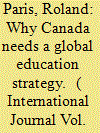

|
|
|
|
|
| Summary/Abstract |
Based on the report of the Study Group on Global Education, this article explains why Canada needs a national strategy aimed at significantly increasing the number of Canadian post-secondary students going abroad for study and work-integrated learning experiences. International education may once have been viewed as an optional luxury. Now it must be seen as a vital tool to equip young Canadians – and Canada – to succeed in a more complex and competitive world.
|
|
|
|
|
|
|
|
|
|
|
|
|
|
|
|
|
|
|
|
|